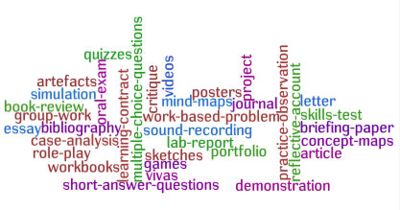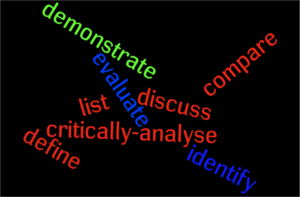Assessing and Evaluating for Learning/A&E Course Modules/Introduction to Assessment and Evaluation module
Contents
Setting the scene
Assessment - defined
as·sess·ment n. 1. The act of assessing; appraisal.
- The American Heritage® Dictionary of the English Language, Fourth Edition copyright ©2000 by Houghton Mifflin Company. Updated in 2009. Published by Houghton Mifflin Company. All rights reserved.
assess verb [T] to judge or decide the amount, value, quality or importance of something
Assessment = Any systematic method of obtaining information from tests and other sources, used to draw inferences about characteristics of people, objects, or programs; the process of gathering, describing, or quantifying information about performance; an exercise-such as a written test, portfolio, or experiment-that seeks to measure a student's skills or knowledge in a subject area.
Evaluation - defined
e·val·u·ate tr.v. e·val·u·at·ed, e·val·u·at·ing, e·val·u·ates
- 1. To ascertain or fix the value or worth of.
- 2. To examine and judge carefully; appraise. See Synonyms at estimate.
- 3. Mathematics To calculate the numerical value of; express numerically.
e·valu·ation n.
- The American Heritage® Dictionary of the English Language, Fourth Edition copyright ©2000 by Houghton Mifflin Company. Updated in 2009. Published by Houghton Mifflin Company. All rights reserved.
evaluate verb [T] to judge or calculate the quality, importance, amount or value of something evaluation noun [C or U]
Evaluation = When used for most educational settings, evaluation means to measure, compare, and judge the quality of student work, schools, or a specific educational program.
Types of assessment
Assessment is a huge and varied area of teaching and learning. Assessment possibilities are only limited by imagination as they can occur in many varied forms.
The A&E workshop group identified the many forms of assessment that they use (6 Aug 09)It was quite a list.

∗ Practical – video evidence of skills ∗ Completion based assessment – tick off list – log book ∗ Portfolios ∗ Collections of evidence ∗ Show case ∗ Project report/package ∗ Visual diary ∗ Workbook ∗ Replica of tools used in industry - workbook ∗ reflective diary ∗ question and answer books ∗ multichoice tests ∗ report writing assignments ∗ observation ∗ case studies ∗ making artifacts ∗ peer assessment ∗ self assessment ∗ industry assessment – panels of assessors from industry ∗ consumer assessment ∗ workplace assessment ∗ essays ∗ learning contracts ∗ literature reviews ∗ blogs ∗ discussion boards ∗ written exams ∗ gap fill and short answer ∗ open book exams ∗ commitment assessment ∗ comparison – self marking ∗ presentations ∗ create a community resource ∗ exit test ∗ debate ∗ resubmit opportunities to increase marks ∗ opinion pieces ∗ role play ∗ external marking ∗ taped conversations ∗ ethnographic essays ∗ critique ∗ vivas
| Check out the list created above and the types of assessment on the wordle image. How many you are familiar with? Are there assessment tools and methods you want to find out more about?
Link to the pdf version for the Wordle image of Assorted Assessments
|
Why do we assess?
Given that we have identified so many tools and methods that can be used, it is useful to take a step back and ask the questions -
The workshop group had a wealth of ideas around these questions. Compare your answers with their responses.
- To maintain competence for practice
- To reach competency (industry standards)
- To check at right level
- Find out what they know/have learnt
- Identify potential changes to teaching
- Identify ongoing learning needs where extra work is needed
- Formative - ongoing development
- Getting feedback on whether teaching and assessment is getting outcomes required
- To prepare for other assessments – building blocks/scaffolding
- Assessment identifies key learning requirements of a course
- Guide through the learning
- To link together all components of information
- Summative – creates end/completion to work undertaken
- Provide something they can use in the future – identified qualification
- Creation of toolkit to use in future
- Develop skills that are transferable for future use
- Reason to research and take in knowledge – incentive
- Helps the students to identify their own progress within a course
- Creates milestones within course
- Link learning from other papers/courses to create holistic approach – integrating learning
- Create self critique / self assessment skills (own quality control)
- ‘bang for bucks’ for stakeholders
| Turning to the literature you can compare the responses to the question Why do we assess? to those of Sally Brown, Phill Race and Brenda Smith (1996)
Feedback: We assess for a variety of reasons including:
|
Key values of assessment
This module is leading you through lots of exploration of your own thinking around assessment.
| Now take time to consider what are the important values of assessment for you?
Suggestions put forward by Brown, Race and Smith (1996) are that assessment should be:
Brown, S. A., Race, P., & Smith, B. M. (1996). 500 tips on assessment. London: Kogan Page. |
You can also compare your own thoughts and the suggestions above with the responses from the workshop group (6 Aug 09)
- Asks the questions that show they know what we need them to know
- Matches the learning outcomes for the course
- Opportunity to show what they know
- Current
- Timely
- Relevant
- Transparent
- Repeatable
- Valid
- Reliable
- Consistent
- Clear
- Language
The language of assessment
One aspect of assessment that becomes critical to the outcome is the use of language and how that is interpreted. You may have a particular understanding of the terminolog used but the students may not take the same meaning from those words.
It is useful to check that there is a common understanding between the person being assessed and the assessor.
| Try the following exercise:
Define these instruction words -
These words were chosen and defined by the workshop group - compare your definitions with theirs which can be found in the A&E course glossary
|
For further ideas this link takes you to a list of instruction words and their definitions from the Online Information Literacy collaborative project between the University of Otago, Dunedin College of Education and Otago Polytechnic.
Reflection on your own assessment
A reflection activity to help with your first course assessment
|
☺ choose a course you are teaching and describe the purpose of the course and all the assessment activities expected in that course to someone who is not familiar with that course (this could be a colleague, a friend or a family member) You will probably find that the person listening to you might start asking for clarification around some of your description – take note of these questions to initially help guide your reflection about the assessment for that course. Try to explain to the other person
|
A useful website to help explore methods of assessment is Oxford Brookes selection methods


